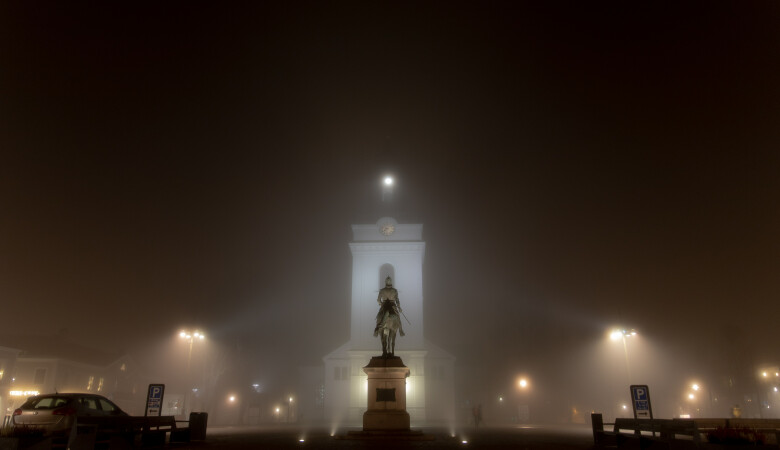The Glory of God Revealed in His Sovereign Freedom (Romans Sermon 66 of 120)
April 17, 2005 | Andy Davis
Romans 9:15
Glory of God, Justice of God, Forgiveness
Introduction: A Natural Aversion to God’s Sovereignty; an Unnatural Attraction to His Glory
Take your Bibles and look with me at Romans 9, we're also going to be looking at Exodus 33, so you can go ahead and find both of those places as we're going to be looking at both this morning. And as I was thinking this morning about the incredible themes that are going to be in front of us today, the most exalted themes in the Bible, it occurred to me there's a kind of a bookends concerning this matter of the display of God's glory to his people. The greatest prayer in the Old Testament, I think, is in front of us today. Exodus 33:18 in which Moses up there on that mountain said, "Now show me your glory." And in my opinion, the greatest prayer in the New Testament is Jesus' high priestly prayer in John 17. And then part of it, verse 24, he says, "Father, I want those whom you have given me to be with me where I am and to see my glory."
They are both asking the Father for the same thing, Moses asking to see the glory of God, Jesus asking that Moses and others would get to see the glory of God, and both of them are going to get their wish. Amen. That is the great joy of our salvation.
Now, the troubling thing for our limited intellects is that Jesus says, "Father, I want those whom you have given me to be with me where I am and to see my glory." That's the doctrine of election, the very thing that is in front of us in Romans 9, and we're trying to understand as we were last week, as we are this week, and God willing, perhaps, next week, to understand the justice of God in all of this, to understand how God is just and righteous while electing and giving this incredible blessing to people who do not deserve it.
I believe we have a natural aversion to the sovereignty of God. I believe we have a supernatural attraction to the sovereignty of God. Can you explain that? A natural aversion, a supernatural attraction. Jonathan Edwards talked about his own conversion and just listen to this, this is from his personal narrative. He said,
"From my childhood up, my mind had been full of objections against the doctrine of God's sovereignty in choosing whom he would to eternal life, and rejecting whom he pleased; leaving them eternally to perish, and be everlastingly tormented in hell. It used to appear to me like a horrible doctrine. But I remember the time very well when I seemed to be convinced and fully satisfied as to the sovereignty of God and his justice in thus eternally disposing of men, according to his sovereign pleasure. And there has been a wonderful alteration in my mind in respect to the doctrine of God's sovereignty from that day to this, so that I scarce ever have found so much as the rising of an objection against it in the most absolute sense in God's showing mercy to whom he will show mercy and hardening whom he will. God's absolute sovereignty in justice with respect to salvation and damnation is what my mind seems to rest assured of as much as of anything that I see with my eyes. The doctrine has very often appeared exceedingly pleasant, bright, and sweet. Absolute sovereignty is what I love to ascribe to God. But my first conviction was not so."
And so I say, we have a natural aversion to the sovereignty of God, and a supernatural delight in it. So also Spurgeon speaks this way.
"There is no attribute more comforting to his children than that of God's sovereignty. Under the most adverse circumstances, in the most severe trials, they believe that sovereignty has ordained their afflictions, that sovereignty overrules them, that sovereignty will sanctify them all. There is nothing for which the children of God ought more earnestly to contend than this doctrine of their master over all creation, the kingship of God over all the works of his own hands, the throne of God and his right to sit upon that throne. On the other hand, there is no doctrine more hated by worldlings, no truth of which they have made such a football as the great stupendous but yet most certain doctrine of the sovereignty of the infinite Jehovah. Men will allow God to be everywhere except upon his throne. They'll allow him to be in his workshop to fashion worlds and make stars. They'll allow him to be in his almonry to dispense his alms and bestow his bounties. They will allow him to sustain the earth and bear up the pillars there over, light the lamps of heaven, or rule the waves of the ever moving ocean. But when God ascends his throne, his creatures then gnash their teeth. And we proclaim and enthroned God, and his right to do as he wills with his own, to dispose of his creatures as he thinks well without consulting them in the matter. Then it is that we are hissed and execrated, and then it is that men turn a deaf ear to us, for God on his throne is not the God they love. But it is God upon the throne that we love to preach. It is God upon his throne whom we trust."
Do you see it in both the quotes? The natural aversion and the supernatural delight and attraction. Now the question is, how can we make that transition? Why is it so? Why is it so?
Well, I believe we were created to delight in God's glory. It's what we were made to do, it's what we were put here on this earth for. We were created to be for God's glory just in our existence, but more than that, we were created to delight in his glory to know it, to ponder it, to take it apart put it back together again, to revel in it, to worship God for it. But sin has interfered directly with this most central purpose of our existence. Sin has come and messed with that very thing for which we were created, and God's redemption restores his glory to its rightful place in our hearts, that's what he's doing, that's what salvation is. And not just in our hearts but in the whole world. For the earth will be filled with the knowledge of the glory of the Lord as the waters cover the sea. That's what he's doing.
Key Question: How does a sinful being go from the natural aversion to the supernatural delight?
Now the key question before us as we're studying Romans 9 is how does a sinful being go from the natural aversion to the supernatural delight? How do we move in that direction to the point where we love God's sovereignty, we enjoy thinking about it, we delight in it, though we don't fully understand it. This I believe is the work of grace going on in all of our hearts as we study Romans 9. People who are in different places… I've had so many wonderful conversations with you over the last few weeks as some of you have come to talk and I wish more of you would come as well. All of us here are in a journey in this way, because frankly, in the end, do you know what we're going to see in heaven? In Revelation 22, we'll get there at the end of the message, but you already know what you're going to find there, you're going to find the throne. When you get to heaven you're going to find the throne and you're going to bow down before it, and you're going to be delighted in it. That's where you're ending up and me too. Isn’t that wonderful? But I think it's greatly to God's glory, to be there as much as we can while here on earth, we serve him better. More fruit comes, and he gets the glory.
And so I believe this is the work of grace going on in our hearts by a spirit led contemplation of Romans 9:14-16. Look again with me at those verses, "What then shall we say? Is God unjust? Not at all. For he says to Moses, 'I will have mercy on whom I have mercy, and I will have compassion on whom I have compassion.' It does not therefore depend on man's desire or effort but on God's mercy."
I. Understanding Paul’s Use of Exodus 33 in Romans 9
Now, let's try to understand what's going on here in Romans 9. How does Exodus 33 fit in to Romans 9? That's what's in front of us and that's why we're going to spend much of our time in Exodus 33. But Romans 9, in general, is answering a great objection against the Gospel of Christ. And that is, it seems that God's word has failed when you consider the almost universal rejection of the Gospel by the Jews. The Jews are God's chosen people. The Jews have certain advantages that are laid out in Romans 9, and yet they are almost universally rejecting their Messiah, they're rejecting Christ. And it seems then that God's word to them has failed, and that's the very thing that Paul's dealing with and he says, "Absolutely not." In verse 6 of Romans 9, he said, "It is not as though God's word has failed."
But why not, Paul? Well, because not all Israel are Israel. There is that larger set of the physical descendants of Abraham, but then there is that smaller set of the children of God. And as he's working within that smaller set, he's making promises to them and God's word to them will never fail. But just because the Jews who are physically descendant from Abraham are rejecting Christ, does not prove that God's word has failed. Then he brings in the case studies of Isaac and Ishmael and of Jacob and Esau. But you know, he goes beyond just saying that God's word has not failed, he then begins to discuss the actual doctrine of election where by Jacob is Jacob and Esau is Esau. It goes very deep at that point, so deep that none of us will ever be able fully to grasp at all. It's impossible study. But as we look at it, he's describing God's purpose, his sovereign purpose in election. Look at verses 11-13, "Yet before the twins were born or had done anything good or bad, in order that God's purpose in election might stand, not by works, but by him who calls, she was told 'the older will serve the younger' just as it is written. 'Jacob, I love, Esau, I hated.'" And verse 16 absolutely cinches it, if you look at verse 16.
I wonder sometimes… I look at verse 16 and I wonder, how can anyone have a question about it after you read this? But it's so plain. "It does not therefore depend on man's desire or effort, but on God who has mercy." Well, that quiets my heart, quiets my murmuring against the doctrine. What does not depend on man's desire or effort? I think the best interpretation for that is God's purpose in election. One could say really all of the salvation plan of God in big picture does not depend on man's desire or effort but on God's mercy. But that goes down to the individual, as well, ultimately. And what does it not depend on? Well, it doesn't depend literally, if I can just go literalistic here, on the one who wills or the one who runs, but on God who has mercy. So you have the one who wills and the one who runs on one side, and then you have God who has mercy on the other, and it says it does not depend on the one who wills. And it does not depend on the one who runs but it does depend on God who has mercy. Now obviously, as you're looking at that, there's a question that just seems to pop in your mind and you say, that seems unfair.
Is God unjust here? This doctrine of unconditional election is hard to accept, it seems unfair. And so the issue of the injustice of God comes up and Paul brings it up in verse 14, "What shall we say then? Is God unjust?" Or literally it says, there is no one injustice with God, is there? May it never be. And then he gives us this answer that seems so definitive to Paul, he says... Alright, here's my key verse, are you ready for it?
"For God says to Moses, 'I will have mercy on whom I have mercy, and I'll have compassion on whom I will have compassion.'" Now there he's quoting Exodus 33:19. And Paul is, in my opinion, the second greatest interpreter in history of the Old Testament. Now, who would the first be? None other than Jesus Christ. There is no greater interpreter of Scripture than Christ. But to Paul, we'll give him position number two, as far as we know, he's the greatest interpreter of the Old Testament other than Christ, and he's going to be bringing in what he thinks is the best and most cinching verse at every point, and here it's Exodus 33:19.
II. The Context of Exodus 33:19
Now, as he spans, his eye traces out over Old Testament Revelation, he comes to this moment in which Moses and God are having an incredible encounter on Mount Sinai and this pinnacle experience is what he's bringing out. Now as usual, Paul just cites the verse and expects that you know what the context is, he expects that you'll see and understand how it fits. Unfortunately, we don't always and so, it's beneficial for us to go back and try to read Exodus 33. So go ahead and do that now. And let's look at the context of Exodus 33:19, and try to understand what Paul saw in Exodus 33:19, that cinches is proof that God is not unjust. What did he see there? Now by this time, the Ten Commandments had been given. The Ten Commandments were the basis of Israel's national election as God's treasured possession.
It was a conditional matter, whereas these other things we're talking about are not conditional, but that was conditional. And God said very plainly in Exodus 19:5-6, "Now if you obey me fully and if you keep my covenant, then out of all the nations, you will be my treasured possession, although the whole earth is mine, you will be for me a kingdom of priests and a holy nation." So there's that keyword 'if.' If you keep this covenant you'll be a treasured possession, you'll be a holy nation. And the people said immediately, "We'll do everything you tell us to do. We'll do it all", so they say. Then immediately God gives them the covenant, he gives them the Ten Commandments. I am the Lord your God who got brought you out of Egypt, out of the land of slavery. You shall have no other gods before me. You shall not make for yourself an idol in the form of anything in heaven above, or in the earth beneath, in the waters below, you shall not bow down to them or worship them for I, the Lord, your God, am a jealous God, punishing the children for the sins of the fathers to the third and fourth generation of those who hate me, but showing love to a thousand generations of those who love me and keep my commandments.
Now, the Ten Commandments were spoken by the voice of God out of the cloud, you remember. And the voice was like a trumpet or like the sound of an earthquake. It was so terrifying that the people begged Moses, to not let God say anything more to them again, or they would die. They couldn't even handle his voice and so they asked Moses to be their intermediary. And God said, "What the people have said is good. Oh, that they would always fear me like this." But realize this is a key thing I did not understand. The Ten Commandments had been spoken by God before Moses ascended to the mountain to get the tablets of stone.
Do you understand that? That's so key? They had heard with their own ears the Ten Commandments. Then he goes up on the mountain to get the tablets of stone, inscribed by the finger of God. In my opinion, that's the beginning of written scripture right there. God's finger began the writing. From then on Moses did the writing and then prophets and apostles after that. And so the finger of God inscribing the Ten Commandments. But Moses is up there a long time, 40 days, and the people lost interest. Their minds started to wander into sin, and together with Aaron, they committed a great and horrible sin, they committed idolatry, they committed great wickedness. They took gold and jewelry that they had plundered from the Egyptians under the mighty hand of God, and they melted it down and they made a golden calf, shape of a bull and they exchanged the glory of God for an image.
They made a trade at that point. In Psalm 106:19-21, puts it this way, At Horeb they made a calf and they worshipped an idol cast from metal. "They exchanged their glory for an image of a bull which eats grass." My friends, that is the nature of sin, that is what it is. It's trading the glory of God for something created. In this case, it was an image of a bull that eats grass, that's what sin is. And they were doing it while Moses was up on the mountain despite the fact that God had clearly told them the Ten Commandments verbally. They had heard his voice, were terrified of him. They promised that they would always obey those commands. As soon as they could, they went into sin. They forgot the God who saved them. It says in Psalm 106, who had done great things for them in Egypt.
This is the essence of sin, it is a shocking exchange of the glory of God for something created, in this case, an image of a bull which eats grass. So therefore, God made his first shocking pronouncement to Moses. Moses is up on the mountain, God is speaking and he says, "Go down quickly to your people, because they have become quickly corrupt." And God said this, "'I have seen these people,' the Lord said to Moses, 'And they are a stiff-necked people. Now leave me alone, so that my anger may burn against them and that I may destroy them. Then I'll make you into a great nation.'" Israel had broken the covenant and they deserved to die and the basis of his threat was their sin as evidence that they were a stiff-necked people. He makes an incredible offer to Moses, "I'll make you into a great nation." I don't have time to go into how that worked and how it was really impossible but that's what he said to Moses, and Moses at this point becomes the intercessor. He's a little bit of a type or picture of Christ who stands at the right hand of God and always lives to intercede for us, a beautiful theme. Again, I don't have time to develop it, but there he stands before God on behalf of his people and he prays so beautifully.
He doesn't pray, "but they're basically good at heart, just give them a chance, because if you really get to know them, they really have some essential goodness," he doesn't even approach that. God has already said, "I have seen this people. I know them better than you do and they are a stiff-necked people." Now, what he does, he says, "Egypt, your enemies will hear of the slaughter and they will think you are unable to bring them in the promised land. Your glory is at stake, your name is at stake, your reputation is at stake, and secondly, God, your word is at stake because you made a promise to Abraham, Isaac, and Jacob, that you would make a great multitude of their descendants and bring them into the promised land. If you wipe them out then what about your promise to them?"
So God relents, and there's going to be a plague and there's going to be a slaughter at the hands of the Levites. A lesser discipline, but he's not going to wipe out all of the people. But then God makes a second shocking pronouncement. In Exodus 33:3-4, he says, "Go up to the land flowing with milk and honey. But I will not go with you for you are a stiff-necked people and I might destroy you on the way." You're like tinder and I am a raging fire. You're just going to get ignited. If I stay near you, you're going to burn. So I've got to get away from you or I might destroy you on the way. This is terrible, it's dreadful, devastating. God is no longer going to go with the people. He's going to separate himself from Israel and they can go on to the promised land without him. God would keep his promise to Abraham, but he sent an angel in his place to do the work for him, but he wouldn't be with the people anymore. Well, they are devastated by this and grieved and so is Moses.
And this brings about Moses's passionate intercession for the people in Exodus 33. At this point Moses is pleading with God to forgive Israel's sin completely and to go with Israel as before that he would reveal his glory to them and that they could just go on and He would be their God, and they would be His people. Now In the middle of that in intercession, Moses makes the most astonishing request that is the focus for us here in Romans 9. In the middle of all of this intercession, Moses says, "Please show me your glory. Please show me your glory." And it was God's response to that request that Paul quotes in Romans 9, the Lord said, "I will cause all my goodness to pass in front of you and I will proclaim my name, the Lord, in your presence, I will have mercy on whom I will have mercy and I will have compassion on whom I will have compassion." Okay, so there's the context. That's the context of this prayer.
III. How God Was Gracious to Moses and to Israel
Alright, now, how had God been gracious to Moses in Israel up to that point, was the foundation of Moses's prayer life here. That's the ground that was under his feet.
Because, you know I find Moses exceptionally bold here. Incredibly bold. So what is the ground under his feet? Well, look at Verse 12, Exodus 33:12, Moses said to the Lord, "see you say to me, 'bring up this people,' but you have not let me know whom you will send with me yet you have said, 'I know you by name,' and you also have found favor in my sight." Now, that word favor, could be translated, grace basically. Moses is quoting God's own words back to Him and saying, God has said to you, Moses, you have found favor in my sight, I have grace on you. And so, that's the foundation of Moses's relationship with God. It's a clear declaration of grace on God's part.
Now, interestingly, and I think you should know this well enough by now, there's no prior statement of Moses's righteousness. There is none. That's not the foundation. It's like I'm basically a righteous and kind and loving individual. That's not it. I'm standing here because you have said you have found favor, I have found favor in your sight. I am here standing in grace, so he's standing on grace and so Moses's boldness depends on God's prior grace to him. Now, God had elevated Moses to a position no human had experienced up to that point. Look back at verse 11. It said, "The Lord would speak to Moses face to face as a man speaks with his friend." Now, this is only metaphorical because we know from later in the account, that Moses cannot handle a full revelation of God's glory, but what it speaks to is the intimacy of the contact between God and Moses. It was at a higher level than had been experienced up to that point. And so with that ground under His feet, with that grace under him he is bold to move to the next level and that's what we're going to see. He asks in effect for grace upon grace.
Look what he says in verse 13. "Now, therefore, if I have found favor or grace in your sight, please show me now your ways that I may know You in order to find grace in your sight." So basically, the further revelations of God's grace are conditional on some things that have to happen along the way, but God's grace is going to meet those conditions in Moses. What do I mean? Well, the first grace is already said, is the right standing in the presence of God. You can't stand in front of him as a sinner except by grace. You understand that, don't you? And so that's the beginning place. But that's not all. He says, secondly, can I have another grace? I'd like to know your ways. Will you reveal your ways to me. Show me what you're doing in the world. Thirdly, so that I may know you, I want to trace out your way so that I can get to know you, God. I want to know who you are, I want to know what makes you move, I want to know what your passions are, I want to understand you so that fourth, I may have more grace in your sight. Do you see how it works?
He's starting with grace and he's moving and he's ascending until he reaches another level of grace and he is asking for the impossible. Just to say, God show me your ways. Basically, I don't see what you're doing, I'm not able to figure it out. It's the very thing that Paul says in Romans 9, 10 and 11 after all that doctrine, he gets to the end of it in Romans 11 and says, "Oh the depth of the riches, the wisdom, and the knowledge of God, how unsearchable his judgments, [and listen] His paths beyond tracing out." So God, please show me what is beyond tracing out.
Show me your ways, because I can't follow it. It's beyond tracing out. So he says, "I'll show you my ways, I'll teach you how I do things." This is nothing less, friends, than grace, upon grace, like it says in John 1:16, "and from his fullness, we have all received grace upon grace." That's what we're asking for. And what is the final grace? I want to know God, I want to be with Him, I want to see him, I want to be in relationship with him. Now, in all of this, Moses is still deeply concerned about His people. Moses wants to know God's way so that he and his people can be pleasing to God. In this place I find Moses is just like Paul in Romans 9, pouring out his heart in prayer for the Jews. He's interceding for his stiff-necked people. He's interceding for the Jews. And both Moses and Paul are confident of their own standing before God based on grace.
But they're not thinking about themselves, they're thinking about their people and they're begging that God would go with the people and bless them. And so, he intercedes that God will continue to go with Israel. In verse 14, Exodus 33:14, he said, "My presence will go with you and I will give you rest." Well, God assured Moses that He would go with him. The Hebrew is singular there. Alright, so he said I'll go with you, Moses and I'll give you rest. Moses isn't finished yet, is he? So, he expands it out and he says in verse 15, "If your presence will not go with me, do not bring us up from here for how shall it be known that I have found favor in your sight, I and Your people." He's linking himself together with the stiff-necked people, the Jews. "How will it be known that I have found favor in your sight, I and Your people. Is it not in your going with us so that we are distinct? I and your people, from every other people in the face of the earth."
Notice again, he in no way pleads the righteousness of Israel. He's not saying, "Look at them again, you'll find some goodness in them." There's nothing there, he's not pleading that way, he's begging for grace. Now later after God has revealed His glory to Moses, Moses openly acknowledge that Israel is a stiff-necked people who do not deserve His presence or to see His glory, frankly, that just encourages Moses to pray all the more for grace. Look at 34, Chapter 34:8-9 after God had revealed Himself to Moses, it says, "Moses quickly bowed his head toward the earth in worship, and he said If I now have found favor in your sight oh Lord, please let the Lord go in the midst of us for it is a stiff-necked people." So, at this point, he's saying, We're stiff-necked, so please come with us. We're stiff-necked, so pour out your grace on us.
He embraces the wickedness of the people and says this is where grace has to work. Apart from that, we have no hope. So go with your people for we are a stiff-necked people and pardon our iniquity and sin and take us for your inheritance. It's almost as if God's greatest glory comes from saving wicked sinners like us, Amen? That's where he gets it, that's where his glory comes in doing this great work of grace and mercy and forgiveness and salvation. Their righteousness is nonexistent. Moses doesn't even bother to talk about it, because it's not there. So then, God graciously grants Moses's persistence, and faith, what he wants. Look at verse 17, "and the Lord said to Moses, this very thing that you have spoken I will do for you have found grace in my sight and I know you by name." Alright, Moses I will give you what you ask for. So he's gone from one level to the next level to the next level. Is Moses finished?
No, he's not finished yet. He wants even more. And so he says in the midst of all this, in my opinion, the boldest request in history. "Please show me your glory." I want to see you, I want to see you, I want to see you as you really are. Show me your glory. Now, here's the incredible thing. This glory of God was the very thing that Israel had despised in making the idol. It was the very thing they'd thrown away as worthless when they made the idol. He's asking for it back. And frankly, it's the very thing that Moses the individual sinner had thrown aside whenever he sinned for all have sinned and literally, the Greek says lack the glory of God. We've thrown it aside, it's worthless to us, we don't care about His glory, we have despised it, we have trampled it by our sin. And what is he asking for? Give it to me back, I want to see it. I want to know it, I want to be in the midst of it. Moses is so close to God here and amazingly, the closer he gets the bolder he gets.
The closer he gets, the more he wants. In my opinion, this is a mark of your own heart. Is your heart cold toward this theme, or is your heart enticed? Is your heart distant from this or are you attracted to the glory of God? Is this the very thing you want, or is it hold no interest for you? The closer Moses got just like Paul in Philippians 3, crying out, "I want to know Christ and the power of His resurrection and the fellowship of sharing in His sufferings, I want to become like Him in His death and so somehow to attain the resurrection from the dead." That's what I want. Paul wants it, Moses wants it. The closer you get, the more you'll want it too. Show me your glory, and so then, God answers this incredible request.
IV. God’s Goodness, Name, and Sovereign Mercy
Moses's requests, in my opinion, it goes right to the heart of all history. Sinners have despised the most valuable thing in the universe and that's God's glory. Saint Augustine put it this way in his confessions speaking directly to God. He said, "Everlasting God, in whom we live and move and have our being, you have made us for yourself, and our hearts are restless until they find their rest in you." We were created to love God's glory, we were created to see it and to know it and we've lost it through sin, we've despised it, we've turned our backs on it. Salvation is when we get it back, salvation is when it comes to rest in our hearts and when finally, we see it with our eyes, that's salvation.
This is the ultimate end of our existence, and our salvation. To see God's glory. Genesis 15:1, "After this, the word of the Lord came to Abram in a vision. Do not be afraid Abram, I am your shield and I am your very great reward. I am your very great reward."
And so Moses asks for a fore taste of that glory while he's up in the mountain in prayer. He asks God to show him, a glory despising sinner, the very thing he despised. Show it to me. I want to see Your glory, the very thing that Moses had despise. And so God says in verse 19, "I will cause all my goodness to pass in front of you and I will proclaim my name, the Lord, in your presence. I will have mercy on whom I will have mercy and I will have compassion on whom I will have compassion." And so he gives a multifaceted answer here. A display of God's goodness, a proclamation of God's name and then an act of sovereign mercy. The display of His goodness, he says, "I'm will cause all of my goodness to pass in front of you."
It's like a stream or a river of light, or glory, or attributes or something and he's just going to be there in one place and it's just going to stream by him. Maybe like the different colors of a prism or something just flowing by the truth and the goodness and the attributes of God. I'm going to cause it to pass in front of you.
Secondly, "I will proclaim my name to you." I'm going to speak my name. Now, a name is a reputation. It relates to character. God's going to say, he says, "I'm going to reveal who I am and what I've done to you, I'm going to speak my name, my covenant name to you." And God had made a name for Himself when He brought Israel out of Egypt. Now he's going to proclaim His name to Moses, He's going to speak it. And God's name means salvation doesn't it, for everyone who calls on the name of the Lord will be saved. He said, I'm going to speak my name to you and you'll call it out to me and you'll be saved.
Well, the gift of grace is given. Look at verses 5-8 of Exodus 34. Moses gets what he asks for. The Lord came down in the cloud, and stood there with him, and proclaimed His name, "the Lord." "And He passed in front of Moses proclaiming, The Lord, the Lord, the compassionate and gracious God, slow to anger, abounding in love and faithfulness, maintaining love to thousands and forgiving wickedness, and rebellion and sin, yet he does not leave the guilty unpunished. He punishes the children and their children for the sin of the fathers to the third and fourth generation. Then Moses bowed down low to the ground and worshipped."
That is a beautiful picture of worship. God reveals Himself, He speaks to him and Moses responds by falling on his face and worshipping God.
V. God’s Name and God’s Sovereign Freedom
Now, what happened there? Well, God spoke His name and God's name is a declaration of who He is. Earlier in the first supernatural encounter that Moses had with God at the burning bush, you remember? The bush is burning, Moses turned to the side, he says take off your sandals, for the place where you're standing is holy ground and he says that he has seen the troubles of his people, and he is going to send Moses back to take them out of Egypt. And Moses says, "Suppose I go to the Israelites and say 'The God of your fathers has sent me to you,' and they ask me 'what is his name?' Then what shall I tell them? And God said to Moses, 'I am who I am.' This is what you are to say to the Israelites. I am has sent me to you."
He is the "I am." The Hebrew pronunciation, Yahweh. The root of it is existence. I am who I am. Now, what he's saying is I am self-existent. I get my existence from myself. I don't get it from any other source. I am who I am means my existence comes from me.
There is nothing else in all the universe that can make that statement. In Colossians 1:16-17, it says, "For by Him all things were created, things in heaven and on earth, visible and invisible, whether thrones or powers or rulers or authorities, all things were created by Him and for Him. He is before all things, and in Him all things hold together." So that means all creation is totally dependent on God, for its original existence and its continued existence. All of us depend on Him at every moment. The sun is constantly held together by the power of God for the glory of God, the Moon reflects the sun's light in its beautiful light rays and we look at it and we say God is holding it together. He created it and it continues to have its being because God said so. So it is with every rock, every stream, every tree, every beetle, every eagle, every human being, every devil, and every angel. All of them originally had their being and have their continued existence because God says so. God is not like that. God is the "I am". He exists of himself, that is the name of God, Yahweh. That's what he pronounced to Moses as He went by, but he's not finished.
He said, "I am that I am." You could also say "I will be what I will be." In Acts 17 it says, "The God who made the world and everything in it is the Lord of Heaven and Earth, and he does not live in temples built by hands, and He is not served by human hands as if he needed anything because He Himself gives all men life and breath and everything else." He said to Job, "Who has a claim against me that I should pay for everything under heaven belongs to me." And he said in Psalm 50, "I have no need of a bull from your stall, I have no need of a goat from your pens. For every animal in the forest is mine, and I own the cattle on a thousand hills.I know every bird in the mountain and the creatures of the field are mine, if I were hungry, I would not tell you for the world is Mine and everything that's in it."
That is our God. He is Yahweh, He is. I am that I am. But that's not all he has to say to Moses. He also says, "I will have mercy on whom I have mercy and I will have compassion on whom I have compassion." This is God's sovereign freedom in action, it's a declaration of what he is going to do. God is free in his actions, including mercy. God does not consult any created being, He doesn't consult human wisdom, he doesn't follow passively after human choices. He chooses, and then we choose after he has chosen.
God will be what God will be. God will also do what God will do. That is His sovereign freedom as a king. And so he says I will cause all of my goodness to pass in front of you and I'll proclaim my name, the Lord, in your presence. I will have mercy on whom I will have mercy and I will have compassion on whom I have compassion. You see, God is not unjust in unconditional election, because it is totally in line with his role and his place in the universe to be free over that. He is a king, He created all things, and he's free to do whatever he wants with his creation. The same is true for all that would come to him and say, "I want to see Your glory. I am not under any compulsion to show my glory to anyone, I'm free in that matter, for the individual Moses and I'm also free in that matter for the nation of Israel. Now, what is the connection of all of this? Back to Romans 9.
VI. Connection to Romans 9: Both Foretaste and Fulfillment Given As God Wills
Well, first of all, we have a universally stiff-necked people. Israel was called a stiff-necked people, God said that they deserve wrath. Well, the same is true of us. Romans 1-3 teaches the same thing. Romans 3:10-12, says "There is no one righteous, not even one, there is no one who understands, no one who seeks God, all have turned aside, they have together become worthless. There is no one who does good, not even one." Do you know what that says? Nobody wants God's glory naturally. We have a natural aversion to God, and we have a natural aversion to His glory. We are not naturally seeking Him, we're naturally running the other way, we are naturally stiff-necked, and therefore God is free to show mercy to us, or not to show mercy. That's a connection. It's also a connection that Moses's foretaste is the very thing that will ultimately be fulfilled for us in heaven. What did he have up there on the mountain? A display of God's glory, it's what he saw, he had an experience of that.
If God shows His intimate mercy to any sinner is an act of infinite grace, that is the foretaste, the fulfillment is a full view of God's glory yet to come. Look at Romans 9:23-24. Romans 9:23 says, very plainly that seeing God's glory in Heaven is the very issue that Paul's dealing with here in Romans. "What if he did this, it says, to make the riches of His glory known to the objects of His mercy, whom he prepared in advance for glory. Even us, whom He also called, not only from the Jews, but also from the Gentiles." Salvation is to see God's glory in heaven, it's to have the full revelation. Not like what Moses had on the mountain. You remember what he said, he said, "I'm going to hide you in a cleft of the rock. I'm going to put you in there and I'm going to put my hand over you because no one may see Me and live. You can't survive a full display of God's glory, you would be incinerated, Moses. And so I'll put you in the cleft of the rock and then I'll pass by and you can see my back, but you cannot see me, and live.
The apostle Paul put it this way, in I Corinthians 15:50, Speaking of the resurrection body, "I declare to brothers, that flesh and blood cannot inherit the Kingdom of God, nor does the perishable inherit the imperishable." You have to be changed. You have to be transformed, you have to get an upgrade in your body. And if you don't get the upgrade you're going to be destroyed. When you get your resurrection body, you'll be able to see God face to face. And so it says in Revelation 22:3-5, No longer will there be any curse, the throne of God and of the Lamb will be in the city, and his servants will serve him, they will see His face and His name will be on their foreheads. There will be no more night, they will not need the light of the lamp or the light of the sun for the Lord, God will give them light and they will reign forever and ever."
And so that is the future, that's what we're talking about. We get to see God's glory. Now the question is, who gets to see it? Who? And he's answered that question. "I will have mercy on whom I have mercy, and I will have compassion on whom I have compassion." God is free in this incredible intimacy. He doesn't have to show it to anybody. He can do whatever he wants. Do you understand that God is free to save out of the whole mass of sinners, one of them only if he so chose?
Or 10. Or 5. Or a 100. Or 20%? Or half of them, or three quarters of them, or 98%, or all of them. He's free in the matter, he can do from zero to 100 and be just and righteous in what he does. What has God done? He has called an elect people, a multitude greater than anyone can count, from every tribe and language and people and nation, and they will stand around the throne and they will give him glory, and praise for salvation.
VII. “Show Me Your Glory”: Is This the Cry of Your Heart?
Now, by way of application, as you look at this, Moses's request, Show me your glory. Is this the cry of your heart? Is this what you want? Is this what you yearn for? Are you attracted to this? Well, if so, then I, may I say to you, God has already done a work of grace in your heart, you're already loving what you used to despise, you're loving what is unnatural to love. You want what you were not seeking. You are yearning, you're yearning now, for what you didn't want at some point in your life. What is written, there is no one righteous, there is no one who understands, no one who seeks God. And Romans 10:20 says, Isaiah said, boldly, "I was found by those who did not seek for me, I revealed myself to those who did not ask for me."
Not one of us sitting here loved and cherished the glory of God and sought it. God came after us. He came looking for us to give Himself to us freely. And can I say to you, there's not a person here man, woman, or child that presently at this moment, seeks God's glory, loves it and cherishes it the way we should. But you know, God is not finished with us yet, he continues to pursue us until he's done saving us. The better you know God the more you're going to ask for. Are you satisfied with how much of God's glory you see? If not, then ask him for more. If you're thirsty, then drink. If you're hungry for God, then come. Jesus said in John 4:10, "If you knew the gift of God and who it is that asks you for a drink, you would have asked Him and He would have given you living water." The better you know God the more you're going to ask him for. So may I urge you today to seek the glory of God. If you're sitting here and you've never trusted in Christ, you don't know Him as your Lord and Savior, can you pray that prayer. It is... I'm convinced that anyone who says to God, "I want to see your glory." He's going to give it to them.
Anyone who calls on the name of the Lord will be saved. Anyone who ask God, show me your glory, He's going to show it to them. But Romans nine tells us who that is, it's those that he's elected by His sovereign freedom before the foundation of the world. Close with me in prayer.






























